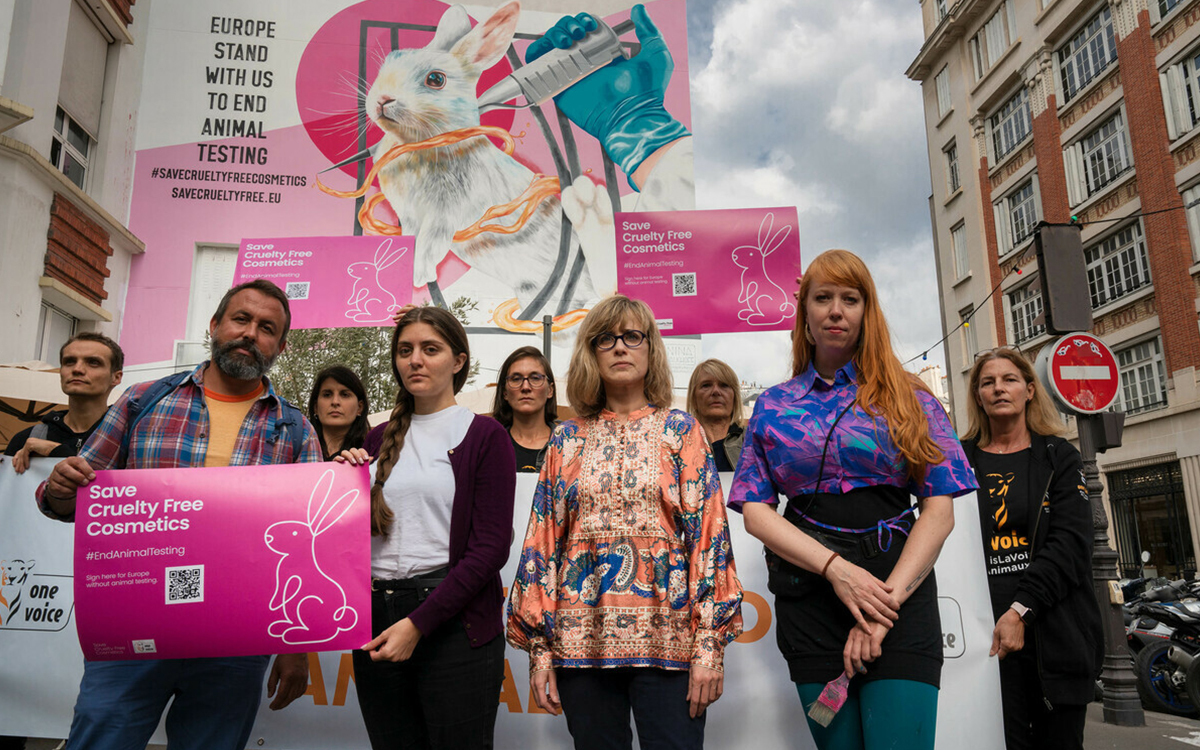

The ‘progressive’ suppression of using animals in chemical testing, not in cosmetics
On 25 July 2023, the European Commission launched a plan aiming to progressively suppress animal testing for chemical products in the whole of Europe, but they will not protect a ban on testing on animals for cosmetic products as requested by the ‘ Save Cruelty Free Cosmetics’ European Citizens’ Initiative (ECI), signed by 1.2 million European citizens. A response that leaves a mixed impression to say the least.
While we were glad about the plan aiming to eventually eliminate animal testing for chemical products and more long-term propositions aiming to reduce and progressively remove animal testing from research and education, the Commission has scandalously ignored calls from citizens to keep a ban on animal testing for cosmetic products, a ban established by legislators more than a decade ago.
Despite the European Union having banned tests on animals for cosmetic ingredients in 2009, tests on animals for chemical products used by workers in the industrial sector or likely to be released into the environment still exist pursuant to the REACH regulation (registration, evaluation, authorisation and restriction of chemicals). For the European Commission, since certain tests have not yet been replaced, banning the use of animals would mean forcing certain products to be withdrawn from the market. As always, the economy comes before animals. Rather than waiting for the EU tribunals to resolve this issue as an ongoing matter as proposed by the Commission, citizens’ requests must be taken into account immediately in order to avoid animals suffering even more.
In the EU and in Norway, 8 million animals suffered in laboratories in 2020. Substances are forcefully administered into their throat, they become infected by diseases rendering them disabled, they are genetically manipulated, subjected to brain damage during surgical operations, exposed to intense pain, and used in breeding programmes that perpetuate the cycle of suffering. However, the Commission is pleased about this “reduction” in 2020 in relation to previous years, without mentioning that it is mainly due to the Covid-19 pandemic, as we saw with the rise in French figures in 2021.
A European participatory democracy tool used for the end of animal use in laboratories
This Initiative was launched in August 2021, in particular by One Voice within the coalitions Cruelty Free Europe, European Coalition to End Animal Experiments, and alongside Eurogroup for Animals, Humane Society International/Europe, and People for the Ethical Treatment of Animals, with support from The Body Shop and Dove brands. It called for the reinforcement and protection of a ban on animal testing for cosmetics, for a transformation of the regulations on chemical products to put an end to tests on animals, and for a commitment to progressively eliminate all tests on animals in Europe. It is the second ECI on this subject that has gained more than one million signatures, after ‘Stop Vivisection’ in 2015, and only the ninth to have been crowned with success among more than one hundred that have been submitted to European institutions.
A positive response that leaves an unfinished taste
Among the positive commitments made by the Commission in response to the ECI, we found:
- the development of a road map to put an end to all obligatory tests on animals for industrial chemical products, pesticides, biocides, and human and veterinary medications. But no precision was given on the means that will be invested in this road map, except that it will be defined during two workshops, in the second halves of 2023 and 2024. It does not have to be done in a hurry… the Commission is fully aware of the need to modernise the law to make the adoption of testing methods without animals easier, which is essential;
- the response to the ECI also mentions creating a committee of experts, preparing workshops, and coordinating national policies to develop research methods without animals, without giving any details as to the more concrete content of these proposals however;
- as for alternative methods, the Commission is pleased to have subsidised their development for up to a billion euros in twenty years – which corresponds to the financing of a few hundred full-time people. Knowing that the Horizon Europe programme has a budget of almost one hundred billion euros over eight years, and that France alone has more than 600 animal testing laboratories, the European desire to simply “continue” financing alternatives frankly seems insufficient.
Citizens now expect all parties concerned to ensure that the measures proposed by the Commission have maximum and significant impact. We will continue to work for yet more ambitious commitments!
Translated from the French by Joely Justice